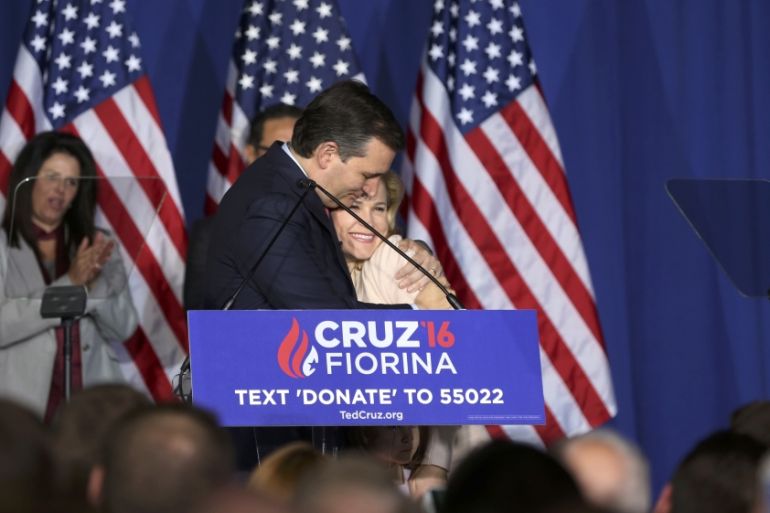Passionate and odd: The end of Ted Cruz
With Trump unstoppable, his main rival heads back to Washington to lick his wounds and contemplate another run.

There was a moment a few minutes into his speech in a rather ornate hall in Indianapolis that it became clear Ted Cruz was done.
This wasn’t the usual stump speech of angry grievances, of radical solutions and of calls to action.
Keep reading
list of 4 itemsFull jury panel seated on third day of Trump’s New York hush-money trial
Jacob Zuma’s nine lives: How South Africa’s ex-president keeps coming back
A flash flood and a quiet sale highlight India’s Sikkim’s hydro problems
This was broader, more expansive and final.
Part of the problem was the expectation game. In politics, especially presidential politics, it’s better to under-promise and over-deliver.
Ted Cruz talked up his chances in Indiana. He called it his “firewall”. He believed the conservatives in the states shared his view of what the Republican party should be and where it should be headed. They would carry him to victory.
READ MORE: Donald Trump becomes presumptive Republican nominee
He did all he could to stack the odds in his favour. But everything he tried seemed to fail.
He set up a pact with Ohio Governor John Kasich, who would essentially leave the state to clear the way for Cruz to take the anti-Trump vote. But many Republicans hated the idea. The deal ignored the fact that Kasich supporters aren’t natural Cruz allies and fed into the Trump narrative that the system was rigged.
He named Carly Fiorina as his vice-presidential running mate if he were to win the nomination. It was seen as arrogant and presumptive. He spent time and money in the state. He flooded the airwaves with anti-Trump ads.
In the end it wasn’t enough.
Cruz blew into the US Senate in 2013 determined to make an impression. Many thought he saw it as a brief stop on the road to the presidency.
He became widely disliked. He engineered a government shutdown. He fought against what he painted as the Washington establishment. He was uncompromising when it came to his conservative ideals. He positioned himself as an outsider.
It was a calculated attempt to win him presidential votes. He openly criticised his colleagues and created such a bad impression that a former Speaker of the House of Representatives described him only last week as “Lucifer in the flesh”.
READ MORE: Analysing Trump’s big foreign policy address
For years, he told anyone who would listen that if Republicans wanted to win the White House they had to put a strong conservative voice in the race. And he was to be that man. He had a plan. A good performance in Iowa would give him a solid start and then, when the race moved to the south, his Christian, evangelical background would earn victories, giving him momentum. In his plan, he had success written all over him
It was telling that few of his senate colleagues threw their weight behind his campaign and those that did, did so reluctantly as a buffer against Trump.
Back to Washington
Iowa was ticked off the list, but he didn’t bank on Donald Trump.
At first, he refused to attack the businessman. He thought when his campaign inevitably imploded, people would move over and back him.
But Trump was the one who blocked his path to victory.
He turned up the heat. He called him “Lyin’ Ted”. He attacked his wife’s looks. He quoted tabloid claims that Cruz had had several affairs. And, in the final hours of campaigning in Indiana, he bizarrely tied Cruz’s father to JFK’s assassin Lee Harvey Oswald.
He may have known late on Monday that Indiana was not to be his when the last opinion polls predicted a double-digit loss to Trump. He may have known at his final campaign stops on Tuesday. He certainly would have realised when the first results came in.
READ MORE: Insults, mudslinging sink Republican race to new lows
And so, as the crowd expelled a surprised “No”, with one supporter shouting “You’re a great man”, the senator from Texas stepped out of the presidential race.
The speech was very Ted Cruz – passionate and odd in equal measure.
He sung Fiorina’s praises. “An incredible, phenomenal running mate,” he said, even though the new alliance was less than a week old.
He said nothing about Trump. No offer of congratulations or support. No words or warmth for the man he had described only a few hours earlier as a narcissist. How could he support a man who attacked his wife and his family?
He will go back to Washington – but there are no new alliances, few new friendships from this campaign. And he will inevitably contemplate another run at the White House.
But it might be a different Ted Cruz that does. America’s Republicans didn’t want this one.